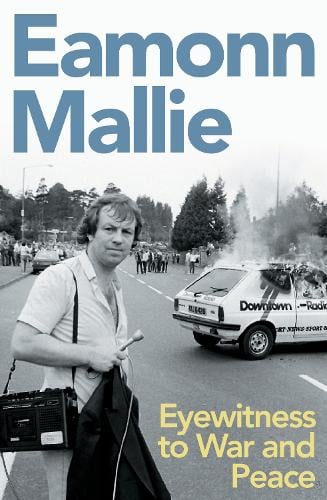TED SMYTH, former Irish diplomat and current member of the Ad Hoc Committee to Protect the Good Friday Agreement reviews Eamonn Mallie’s book

AT a time when we are confronted by daily scenes of horror and butchery in the Middle East, it is heartening to read a book which provides unique insights into the people and agonising process that led to the ultimate cessation of violence in Northern Ireland.
Eamonn Mallie, a superb and fearless journalist for 40 years, has written such a book, Eyewitness to War and Peace (Merrion Press). This fast-paced book reveals the secret and relentless talks over decades that ultimately ended the bloodshed to create a society that recognized the equal rights of nationalists and unionists.
Incidentally, Mallie’s book perfectly complements the memoirs of a neighbour from Co. Down, Martin Doyle, who chronicles the lives lost and the long tail of trauma in Dirty Linen.
Mallie, who lived for scoops, regularly risked his life by driving to where the story was, asking provocative questions and sticking his microphone up the noses of everyone from royalty to prime ministers, from paramilitary leaders to police chiefs and army generals. From the 1970s onwards he was the voice of Downtown Radio Belfast as it broke the mould with news headlines every half hour and news on the hour.
I recall seeing Mallie at the signing of the historic Anglo-Irish Agreement by Taoiseach Garret FitzGerald and Prime Minister Margaret Thatcher in Hillsborough Castle in 1985. Ian Paisley and his fellow rioters were outside attempting to stop the signing and breaking windows. Mallie asked Thatcher if she would face down those who opposed the treaty. Thatcher did not reply to the question, but over subsequent months she and the RUC and British army defeated the loyalist violence, the first time a British government had done so in the history of Northern Ireland.
As an Irish diplomat, I travelled frequently to Belfast in the 1980s to take the political temperature from journalists like Mallie who had their finger on what was really happening. They included Mary Holland, David McKittrick, Ed Moloney, and Chris Ryder.
Mallie’s parents identified with Seamus Mallon and John Hume and Mallie says he was “always an admirer of Hume’s anti-violence and pro-European stances”.
But Mallie did not allow his opposition to the use of violence for political ends to be a reason “to shun those who chose to take up arms” because he wanted to understand why they felt the need to use violence.
Mallie describes in vivid detail how John Hume, despite all the setbacks and criticism, finally succeeded at great cost to his health in bringing the gunmen in from the cold.
Hume told Mallie that he initiated secret talks with Gerry Adams in the 1990s because he believed that Adams was looking for a way to move to an exclusively political campaign for nationalist rights and a united Ireland.
In the 1980s, Mallie recalls how the IRA had reached the conclusion, as had British General Jimmy Glover, that neither side could win, that the British could not be bombed out of Northern Ireland and that the IRA could not militarily be defeated.
Nevertheless, Mallie muses, “what continues to baffle me is how the Sinn Féin leadership, Adams and McGuinness, ever managed to convince the IRA to call a cessation of violence given the endless turmoil in its ranks”.
One significant factor was that Sinn Fein realized it could succeed in electoral politics when ailing hunger striker Bobby Sands was elected to the Westminster parliament in 1981.
The election of Tony Blair and Bertie Ahearn in the late 1990’s gave the peace process fresh impetus. They along with President Clinton decided to use their immense political capital to go all out for an agreement. As Blair said at the Queen’s University GFA 25 events last year where the three old pols had reconvened: “We were too young to be cynical about the prospects of peace.”
As Mallie writes, the Good Friday Agreement almost didn’t happen but the political leaders made sacrifices and took risks for the sake of peace. These included Ulster Unionist leader David Trimble who stood up to Ian Paisley’s attempt to destroy the agreement. Paisley later relented and became First Minister with Martin McGuinness of the Stormont power sharing Assembly.
US Senator George Mitchell, who played a pivotal role in the Good Friday Agreement, wisely concluded that there would have been no peace process without John Hume and no peace agreement without David Trimble.
Anyone wanting a well-written and exciting account of the Troubles should read Eyewitness to War and Peace.
Ted Smyth, a former Irish diplomat and business executive who lives in the United States, is a member of the Ad Hoc Committee to Protect the Good Friday Agreement.

